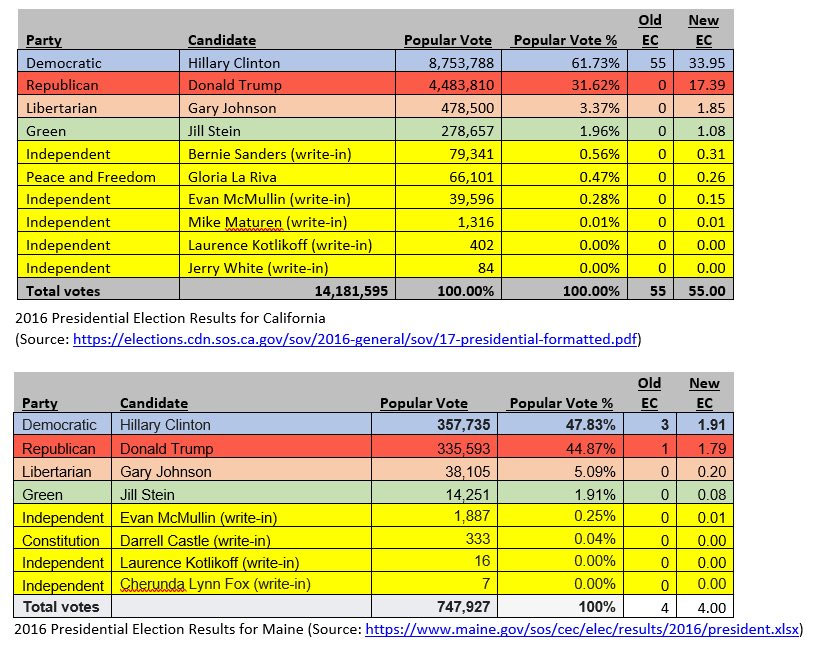
THE NEW ELECTORAL VOTE: A Modest Proposal to Save and Improve the Electoral College (Without going to the “extreme” of a National Popular Vote)
There is currently a debate in the United States of America about eliminating the Electoral College (EC) and replacing it with a National Popular Vote (NPV). There are also ardent defenders of both arguments. There are valid arguments on both sides.
(TL;DR at the bottom for those with short attention spans)
In this article, I am proposing a compromise between those who want to preserve the EC, and those that would rather switch to a NPV. The proposal is one that addresses the concerns of both sides, one that could offer us a better, more representative path forward. I present the argument as an American who wants to continue working towards a “More Perfect Union” and “Secure the Blessings of Liberty to Ourselves and Our Posterity”.
Sadly, the word “compromise” has been made into a dirty word by extremists on both sides of the political spectrum.
I would remind all sides that “Compromise” is that which makes a peaceful coexistence possible, and perhaps we have forgotten that in our zeal to present our own points of view.
At its most basic, our Republic, and the Democratic principles that it is built upon is simply a method to allow us to solve our differences and live together in Domestic Tranquility. When our system is no longer meeting that objective, we should be willing to improve “Ordain and Establish” something that better achieves these goals.
One can both respect the reasons why the EC was created, primarily to protect the representation of states with small populations from the states with large populations, while also recognizing it is no longer well serving its initial intended purpose.
Because of the flaws of our EC, elections are skewed not towards Big states, but towards swing states, where the party support is roughly evenly split. Candidates cater to their supporters, rather than reaching out to truly represent “We the People”. Swing states, not the big or small states, get the most money spent on campaigns, and the most visits from candidates running for office.
We should be rightfully concerned that our system of elections has several times now in our nation’s history elected a President who doesn’t enjoy the support of the majority of the population. This should be a rare, not common event.
One of the flaws with the NPV though is it does indeed have the possibility of marginalizing the states with a smaller population and favoring urban areas over rural areas. Yet, one of the flaws of the EC is it marginalizes and ignores the people in states where one party dominates.
In the 2016 Presidential Election, 4,483,810 voters who chose the Republican candidate in one state were essentially ignored and unrepresented by the Electoral College, equivalent to the population of Wyoming, Vermont, Alaska, North Dakota, South Dakota, and the District of Columbia, and Guam (they too are U.S. Citizens let us recall) combined with their 4,451,959 people in all.
Those 31.62% of California Voters in 2016 were not at all represented by the 100% of the 55 electoral votes which went to the Democratic Candidate, and NONE to the Republican Candidate.
The Democratic candidate received 100% of the electoral vote, even though they only achieved 61.73% of the California vote. It is the “winner take all” aspect of how electoral votes, not the electoral votes themselves that are exacerbating the situation, and not truly representing the people, in ALL states, not just big or small states.
Even in Maine, where the electoral vote is allowed to be split, the Democratic candidate received 75% of the electoral votes (3), even though they only received 47.83% of the votes in that state. The Republican Candidate received 1 electoral vote with 44.87% of the vote there.
How is that reasonable by any measure?
Supporters of the National Popular Vote (NPV) would claim the only answer is to do away with the Electoral College entirely. It is not an argument without merit. It is the way elections are handled in most other democracies.
The problem with the NPV is it ignores why the EC was created. We are the United STATES of America, not the United PEOPLE of America after all.
(Although, these days, it would also be wise for “We the People” and our elected officials not to forget about the UNITED part too.)
The Modest Proposal
Electoral votes should be distributed proportionally by each state based on the popular vote within each state. Each state would still get the number of electoral votes the way it is calculated now, to protect smaller states from bigger states as the Constitution intended.
If a theoretical state has 10 electoral votes, and one candidate gets 60% of the electoral vote and the other gets 40% of the electoral vote, with this Proposal, “The New Electoral Vote” the first candidate should get 6 electoral votes, and the other candidate should get 4 electoral votes.
I would suggest we should bring it to two decimal places though, to more accurately reflect the popular vote within the individual states, so if the winning candidate gets 61.42% in the above example, they should get 6.14 electoral votes. In the event of a tie, the votes could be calculated out to a third decimal place.
Using this method, with the example of California in the 2016 Presidential Election, Electoral votes would not have been 55 for the Democrat and 0 for the Republican, instead, they would have been:
Democrat: 33.95 electoral votes
Republican: 17.39 electoral votes
Libertarian: 1.85 electoral votes
Green: 1.08 electoral votes.
This much more fairly represents how the people of California voted.
In Maine, the results would look as follows.
Democrat: 1.91 electoral votes
Republican: 1.79 electoral votes
Libertarian: 0.20 electoral votes
Green: 0.08 electoral votes
Whether we wanted to include candidates who received less than a whole electoral vote, or not, would be open to discussion if the proposal was ever seriously considered.
The EC consisting of people actually meeting to decide is quaint and archaic, and is the part of the EC that could be dismissed. If people decided they still wanted to keep the actual electors, then perhaps a decision could be made how to distribute the electoral vote among the electors, with some electors perhaps only representing a fraction of a vote. It is a solvable problem.
The other issue with a NPV that isn’t often discussed is simply this. Do we trust people in other states to fairly represent their vote totals? Do we think there might be fraud or simply incompetence affecting vote tallies? What if a state claimed to have 1,000,000 voters than actually voted in a NPV scenario? With the NPV, this could severely impact that total, but by using electoral votes, one state’s malfeasance or incompetence could only affect their Electoral vote totals and have less impact on the overall outcome.
The most significant advantage of distributing the votes from the EC in the manner described is that candidates would have to run their campaigns to address ALL the voters, in ALL the states, and not just targeting specific states, and their voter bases.
No state could be taken for granted, or ignored because it is a “safe” state, even if it has been gerrymandered to protect one party over another.
Even if a candidate did not win the majority in a state, if they energized enough of their supporters to come out, it could sway the national election.
If we distributed votes of the EC in this manner, it would be much less likely for a candidate to not win the popular vote, and even if they did, the difference between the Popular Vote and Electoral vote would be much closer together, and the candidate still would have to have shown a broad base of support across the country.
Our system of election should truly represent us, We the People, ALL the people, and the great diversity of opinion and belief that exists across the nation.
TL;DR (Too Long; Didn’t Read) Summary:
Instead of a National Popular Vote, the Electoral College votes of each state should be distributed proportionally, based on the votes in each state. This should be done to at least two decimal places to avoid ties, and better represent who the voters in each state have chosen.

Leave a Reply